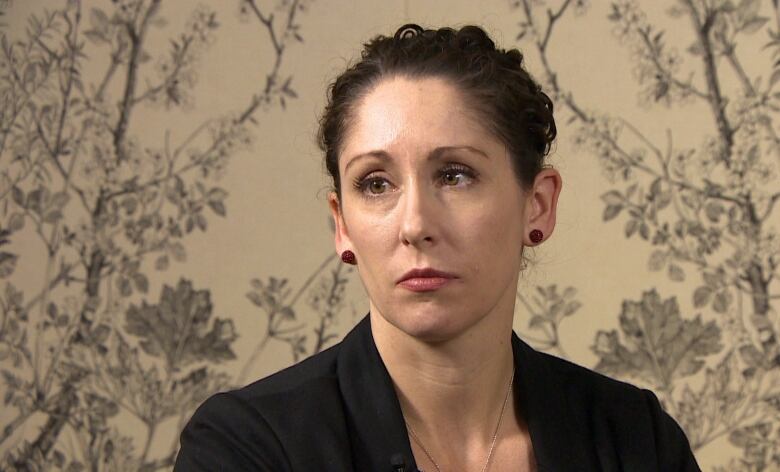Sask. has the worst intimate partner violence rate of any province. Here's what advocates say needs to happen
There were at least 37 intimate partner homicides in Sask. from January 2015 to June 2020

WARNING: This story contains graphic details of violence.
Shirley Parkinson's sister Mariann Rich still remembers the knots in her stomach that would form as her sister talked about her husband's temper.
Parkinson told Rich she had"learned how to not set him off" and would question her own behaviour as his became more unpredictable.
"You made me do this,"Donald Parkinson would say to Shirley.
"Maybe I'm crazy," she would say to her sister.
These stories made Rich uneasy, but the two of themnever imagined the growing tension would escalate to murder. Looking back, Richknows the warning signs were there.
Parkinson's husband of 27 years bludgeoned her to deathwhile she was sleeping in their rural home.Then he killed himself.Ithappened in 2014.
For Rich, the pain is still raw with every new missed milestone that passes. Her sister never made it to 60 and never got to meet her first grandson.
"It's almost seven-and-a-half years later, and there are times when it feels just like yesterday because it has such a huge emotional impact," Rich said. "The grief doesn't go away, and what really upsets me is to know other families are going through the same thing."
Rich said she knows of other cases of people murdering their spouses in the area in the last five years. These anecdotal stories are backed up by statistics.
CBC spent 16 months compiling and analyzing data on intimate partner homicides across Canada from January 2015 to June 2020 for the investigative series Deadly Relationships.
There were at least 37 intimate partner homicide victims in Saskatchewan during that time. At least 17 of them were Indigenous and 29 were female.
Saskatchewan has the highest rate of reported intimate partner violence among all provinces and more than double the national rate, according to Statistics Canada's most recent data.
Rich said she is frustrated by the high rates because both provincial and federal governments could do things to bring them down.
"It's preventable and we don't seem to grasp the concept that we can make a difference," she said.

Intimate partner homicide is the most preventable type of homicide because it's so predictable, according to advocates like Jo-Anne Dusel, executive director of the Provincial Association of Transition Houses and Services of Saskatchewan(PATHS).
More than one in three people accused of intimate-partner homicide demonstrated at least one warning sign prior to the killing, according to the CBC News investigation. The warning signs that predict when an intimate relationship will end in death have also been well-documented by advocates, Dusel said.
The most dangerous time is when a victim is planning to leave a relationship.
CBC obtained the details for 25 of the 29 female victims killed in Saskatchewan. More than half of them had recently separated from their partner or indicated they wanted to get out.
- Man sentenced to life in prison for shooting wife Heidi Veit in Wilkie, Sask.
- Lawyers argue whether Jenny McKay's diary should be evidence at husband's murder trial
- Celeste Yawney's mother was 'fearful and concerned' for daughter's safety, murder trial hears
Dusel saidthere are ways to help people living in abusive situations before the situation ever escalates to that point but policy makers and government need to put it into practice.
Making control criminal
Advocates point to one change that could have an immediate effect. They would like to see "coercive control" made illegal.
Coercive control is an umbrella term for behaviours by a current or former intimate partner that causes the victim to fear they will be physically harmed, causes their mental health to decline or causes the victim distress that has a substantial adverse effect on their life. These behaviours are not chargeable offences, like physical assault or explicit death threats, under the Criminal Code.
Dusel said she spent two decades working at domestic violence shelters with women who were told they couldn't be protected by the legal system.
"Here's me as a shelter worker sitting across from a woman who's terrified and been told there's nothing police can do," she said. "Very often I would hear, 'What? They won't help me until he kills me?'"

A private member's bill that would criminalize coercive control has been introduced inParliament.
Criminalizing the behaviour could help victims through no-contact or court-protection orders before they are killed, said Dusel's colleague Crystal Giesbrecht, director of research at PATHS.
CBC's recent analysis looked at close to 400 cases of intimate partner homicide in Canada and found more than one in three involved warning signs like a recent separation or coercive control. The analysis was unable to draw conclusions about warning signs in the remaining two-thirds because information from police reports was thin.
Giesbrecht said other domestic death reviews that have access to data beyond police reports show coercive control is almost always present.
"It's been recognized by domestic violence death reviews as a very significant risk factor," she said.
Criticism of push for criminalization
Not everyone agrees that legislation is the solution to coercive control.
Court-orders and police have been known to fail victims before. CBC's analysis found that 36 victims across Canada were under court-ordered protection intended to keep them safe from the accused when they were killed. Several Saskatchewan victims had contacted the police about violence before they were killed. One woman had contact with the police at least six times.
Dusel acknowledged that there are concerns with expanding police power, especially among communities that are already over-policed, but still supports the legislation.
"Let's fix the problem with the justice system and let's ensure that vulnerable populations are not being treated differently rather than preventing new legislation from coming forward that would be protective."
Direct programming at abusers
Giesbrecht and Dusel believe the focus needs to shift when talking about intimate partner violence. CBC highlighted existing major gaps in the system when it comes to supporting people fleeing violence in a 2020 analysis.
But the resources for abusers are even thinner.
"Providing services that combine accountability with treatment and support for those who are using violence is the missing piece of the puzzle in addressing the epidemic of intimate partner violence," Dusel said.
- Sask. shelters turn away people fleeing domestic violence more than 600 times per month
- Sask. domestic violence survivor says lack of services could make victims 'suffer in silence'
Giesbrecht said people engaging in abusive behaviour need to be able to self-refer or access programming before the violence even becomes physical. She said if charges can be laid in a coercive control situation, then that could be a pathway to restorative justice programming.

In Saskatchewan, the File Hills Qu'Appelle Tribal Council runs 52-week domestic violence intervention program. The intensive court-ordered course program is the only of its kind in the province.
Dusel said other jurisdictions are trying some forms of help for perpetrators. Nova Scotia is running a men's help line and Alberta is piloting a men's shelter for perpetrators.
More programs like this could help break the cycles of violence, Dusel said.
Start in school
Mariann Rich, now an advocate for stopping domestic violence, said young people need to know what a healthy relationship looks like and when they need to get help, for them self or someone else. She wants school curriculums overhauled and she's not alone.
"Why are we focusing so much on the victim after the violence has taken place instead of focusing our attention and even some funding on preventing the violence from occurring in the first place?" Dusel questioned.
Dusel said education embedded in the core curriculum for all ages can stop the violence before it starts. She said students must be taught about healthy relationships, patterns of abuse, rape culture, control and power dynamics.
"For seven years I've been told, 'well, it's hard because the Ministry of Education doesn't control the school divisions and nobody wants to implement any sort of core curriculum on this topic,'" she said.
The consistently high rates of violence indicate the status quo isn't enough, she said.
"It can't just be legislated out of existence, and you can't just provide support to survivors after the fact and expect things to change," she said.
- Sister of domestic homicide victim says public awareness crucial in prevention
- Sask. teen sexually abused as child says school system didn't equip her to escape
Mariann Rich is still haunted by questions.
"How did I miss it? How did I not see it coming?"

She thinks about others who are connected right now to someone in a violent or dangerous situation, where there's still time to intervene. She said people too often think violence among romantic partners should be dealt with behind closed doors.
"It's not private. It is everybody's business. We have to get past 'it's not our business It's in a partnership. It's within a marriage or at home, so we can't look at that,'" she said.
"Like hell. We have to look at that."
Support is available for anyone affected by intimate partner violence. In Saskatchewan,www.pathssk.org has listings of available services across the province. You can access support services and local resources in Canada by visiting this website. If your situation is urgent, please contact emergency services in your area.
GETTING HELP:
1-800-799-SAFE (7233)
OR TEXT "START" TO 88788
With files from Tara Carman, Kimberly Ivany, Eva Uguen-Csenge, Bonnie Allen












_(720p).jpg)


 OFFICIAL HD MUSIC VIDEO.jpg)
.jpg)



























































































